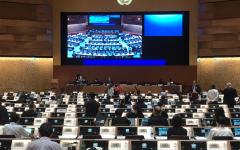The 51st Session of the Commission for Social Development took place from 6 to 15 February 2013, in New York. The priority theme this year was “Promoting empowerment of people in achieving poverty eradication, social integration and full employment and decent work for all”.
More information on this session
Resolutions:
The Commission for Social Development adopted 5 resolutions and all of them contain disability language. The resolution on ‘Mainstreaming disability in the development agenda: towards 2015 and beyond’ was entirely focused on disability and has a very strong development perspective. This resolution recognises disability as a cross-cutting issue, underlines the importance of a disability inclusive post-2015 process, encourages the implementation of the QCPR and has a very good gender angle. The other 4 resolutions on family, ageing, youth and Africa´s development all include references to persons with disabilities. Draft Resolutions
Reports:
Two specific disability reports were prepared for this session: ‘Monitoring of the implementation of the Standard Rules on the Equalization of Opportunities for Persons with Disabilities’ (E/CN.5/2013/10), which is the annual report prepared by the Special Rapporteur on Disability; and ‘Mainstreaming disability in the development agenda: towards 2015 and beyond’ (E/CN.5/2013/9), which primarily focuses on follow-up frameworks and strategies for disability mainstreaming and suggests that three major elements be considered throughout the High Level Meeting on Disability and Development (HLMDD): how to improve monitoring and evaluation through steps such as the creation of evaluation criteria, measurable and time-bound targets and disability-disaggregated indicators; how to increase and guide capacity-building efforts in order to strengthen disability-mainstreaming, and how to better support coordination among key actors and stakeholders at all levels. The report suggests that the HLMDD aims toward the creation of a strategic framework for action at the international, regional, sub regional and/or national levels. Finally, It concludes that action strategies be carried out with the participation of, and in close consultation with, DPOs.
Related Documents and links:
- Statement made by Mr. Shuaib Chalklen (Special Rapporteur on Disability)
- Panel discussion "Toward a disability-inclusive post-2015 development framework: Regional perspectives" held on 12 February 2013.

